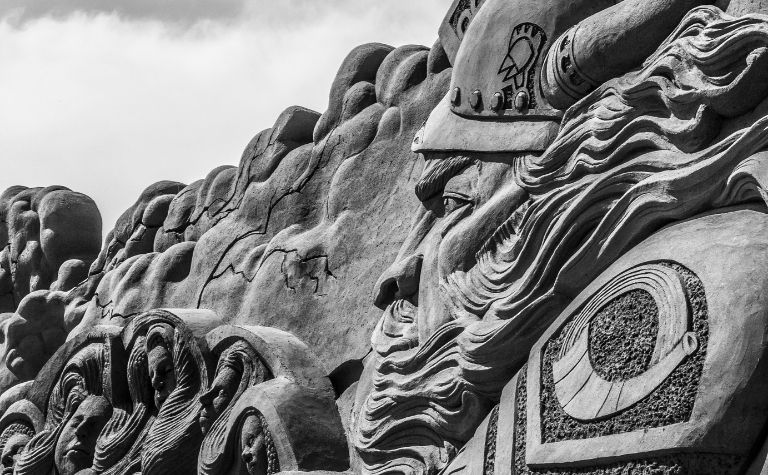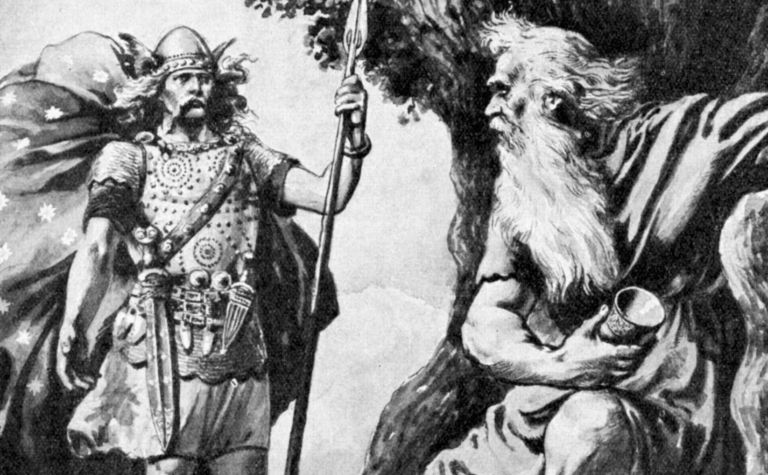For fans of Greek and Roman mythology or any of Rick Riordan’s books, the concept of demigods isn’t a new one.
The Greek gods were particularly amorous with humans, and as a result, they had several half-god/half-mortal children. But what about Norse mythology; are there any Norse demigods?
There are only a few named Norse demigods. Some famous Viking kings and warriors claimed to be the offspring of gods, and the Volsungs, Scyldings, and Ynglings were supposedly descended from them.
Still, there are very few specifically named characters like Hercules or Achilles.
This article will further explore the concept of Norse demigods, the interactions between the gods and humans, and more. It will also take a look at demigods from other pantheons and examine them.
Also, see Is Valhalla Heaven or Hell? to learn more.

Volsungs, Scyldings, and Ynglings
Although there were very few singularly named Norse demigods, there were entire groups of people who were supposedly descendants of the gods.
Volsungs
The Volsungs, for example, were direct descendants of Odin. The Saga of the Volsungs tells their story. [1] It starts with a man named Sigi, who is the son of Odin.
Since he never appears in Asgard, most scholars believe Sigi had a mortal mother, which would make him a demigod, though the term is never explicitly used in Norse mythology.
Sigi’s grandson, Volsung, became a great king in his own right and had many children and descendants.
They were all fierce warriors who collectively became known as the Volsungs. The most famous of these was probably Sigurd the Dragon Slayer.
Scyldings
The lineage of the Scyldings is more contested, with some sources, specifically Danish legends and traditions, claiming they have no relation to the gods.
According to Snorri Sturluson’s Prose Edda, though, Skiold (also Skjöldr or Scyld) is a son of Odin. As with Sigi, there is no mention of who Skiold’s mother is.
Skiold was the first legendary Danish king, and his descendants, the Scyldings, were all related to Odin through him.
Anyone who has ever read Beowulf should be familiar with the famous Scyldings, led at that time by a descendant of Skiold, Hrothgar.
Ynglings
The Ynglings, also called Scylfings, claimed to be descendants of the god Frey. Many of the famous Ynglings were likely wholly fictionalized.
However, some of the people mentioned in the stories about them were real, including Harold Finehair and his family, who were tangentially related to the Ynglings.
Also, see Norse Gods vs. Greek Gods: What’s the Difference? to learn more.

How Did Norse Gods Interact with Humans?
Unlike gods from other pantheons, Norse gods often interacted with humans by crossing the Bifrost to visit Midgard.
There are many stories of gods talking with humans, sleeping in their homes, eating with them, guiding and helping them, and even punishing them, as in the case of Mundilfari.
Did Norse Gods Mate with Humans?
The Norse gods may have mated with humans, as the existence of the Volsungs, Scyldings, and Ynglings would suggest.
However, there aren’t many stories people can cite as evidence of this fact. Per the myths, the gods were more likely to mate with one another or with the giants (Jotun).
For example, these figures are commonly recognized as demigods in Norse mythology:
- Sæmingr
- Bragi
- Sleipnir [2]
It is interesting to note that none of those three demigods is the child of gods and mortals.
Instead, Sæmingr is the son of Odin and Skadi, a giantess and Njord’s wife.
Bragi’s father was also Odin, but most sources agree that his mother is also a giantess named Gunnlod.
The myths never explicitly reveal this to be the case, but since Bragi is the god of poetry, it would make sense that he was born from the union between Odin and the giantess whose sole purpose in the tales was to guard the mead of poetry.
Sleipnir’s birth is even more strange. He is the son of Loki and the giant horse Svaðilfari, and in that pairing, Loki is the mother.
One notable edda, Rigsthula, tells the story of how a man named Rig visited three different couples and slept with them, and nine months later, the couples all had children. [3]
The first couple had a son they named Þræll, which translates to “thrall” or “slave.” The second couple’s son was named Karl (“freeman”), and the final couple’s son was Jarl (“earl” or “nobleman”).
Many readers of the myths believe that “Rig” is another name for the god Heimdall. If so, Rigsthula would be the most overt story of a god mating with humans in all of Norse mythology.
Also, see Does Norse Mythology Have Sins? to learn more.
What Are Demigods Like in Other Mythologies?
Demigods are the children of gods and mortals; they’re usually not immortal but have special powers, attributes, or gifts that set them apart from humans.
Some are stronger and faster than mortals; others are more beautiful, elegant, or charming. Some are extraordinarily wise or clever.
Like gods and mortals, however, all demigods are different and have distinct personalities, strengths, and weaknesses.
Furthermore, not all demigods have good lives or happy endings simply because of their semi-divine status.
Achilles dies when Prince Paris shoots him through the heel – his one vulnerable spot – with an arrow.
Hercules (or Heracles), driven mad by Hera, murders his wife and two children whom he loved very much.
He later dies after being accidentally poisoned by his new wife and throwing himself on his own funeral pyre. (He becomes a god after death, though, so his story didn’t have an entirely bad ending.)
Hercules wasn’t the only demigod to reach full godhood, though. In Hindu mythology, all demigods eventually become full gods.
In fact, in Hindu, the term “demigod” actually means “deities who were once human and later became devas (gods) and are worshiped as such.”
Dionysus, who most people number among the “original” Greek gods, was also a demigod until Hera granted him full godhood.
Conclusion
Demigods may play a significant role in various myths around the world, but they’re less prevalent in the Norse tales.
Also, see Is Norse Mythology or Greek Mythology Older? to learn more.
